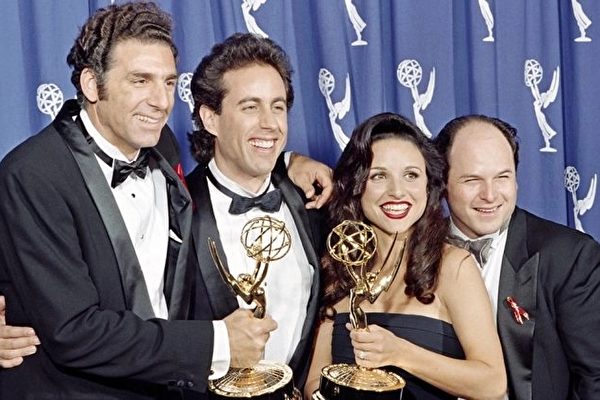Jerry Seinfeld, who once rose to fame for starring in the beloved American sitcom “Seinfeld,” has now entered the comedy battlefield with a flag of concern raised high. The American stand-up comedian believes that left-wing individuals are destroying the sanctity of comedy.
The battleground no longer lies between left and right, or even between liberalism and authoritarianism, but rather between reason and utter madness.
Take a look at the ludicrous pandemic lockdown measures, men transitioning from Y chromosomes to X chromosomes to participate in women’s sports, and the lewd material targeting children, and one can’t help but wonder: when did madness become the new normal?
World’s richest person, Elon Musk, pointed out on his X platform that it’s time to “legalize comedy again,” hitting at the core of the issue.
One of the rules of comedy is to “challenge authority.”
Jokes should target the powerful and oppressors, not the victims. But are victims always victims? Can we change our boxing tactics?
British comedian Ricky Gervais is known for his innovative and side-splitting humor.
He dances gleefully on the tightrope, mocking the underprivileged, yet remains unscathed, while many comedians find themselves canceled for their audacity.
Seinfeld has recently been somewhat lucky, barely escaping being thrown into the abyss. However, he has become a controversial figure as a group of over a dozen students at Duke University protested his speech at their graduation ceremony because as a Jewish person, Seinfeld has expressed support for the state of Israel.
It’s truly shocking, indeed.
This leads to deeper reflection: why does the comedy world often find its leaders among the Jewish community?
Seinfeld, a prominent Jewish-American comedian, standing tall amidst controversy, embodies a broader historical narrative where humor is not only a skill but also a coping mechanism.
In times of turmoil, from the overthrow of kingdoms to the reverberations of massacres, and the unspeakable terror, unwavering humor has not only survived but thrived, especially among the Jewish people.
From the era of vaudeville to the digital age, these individuals, perennially persecuted, have become the primary storytellers of comedic anecdotes, marking a unique footnote in history.
The laughter of Americans is almost dominated by Jewish comedians: from the Marx Brothers in the last century to Mel Brooks, and today, Jerry Seinfeld and other legendary figures, they stand out in the comedy arena, considering that Jews make up only a small fraction of the U.S. population.
According to some polls, the surge of these comedy actors indicates that humor is a core component of Jewish identity, surpassing even the most sacred religious practices.
This phenomenon is not exclusive to America. From the icy lands of the former Soviet Union to the sunny streets of Tel Aviv in Israel, Jewish comedy geniuses have left their mark.
The Jewish affinity for comedy seems to be ingrained in their cultural DNA, serving as both a shield and a sword, allowing them to laugh heartily in adversity and emerge stronger and more rational.
This underscores the potent power of a well-timed joke, not only relieving momentary discomfort but also guiding a nation through its darkest times, making humor not just an act of rebellion but a survival mechanism.
In an environment where comedy is restricted, Seinfeld, in an interview on “The New Yorker Radio Hour,” said that the iron-fisted rule of the extreme left and garbage politicians, coupled with a general fear of repercussions, effectively stifled the spark of television comedy.
Seinfeld pointed out that television networks seem to have declared, “We’re no longer making comedy shows.”
Gone are the days when people could find joy in sitcoms like “The Mary Tyler Moore Show” or “All in the Family” on television channels.
“Where is it?” Seinfeld posed this question in an interview, echoing the bafflement of audiences who remember the days of unabashed laughter.
Comedy is disappearing not just in America.
In Australia in the 1980s, we had comedy TV series such as “The Comedy Company,” “The Paul Hogan Show,” “The D Generation,” and “The Norman Gunston Show.”
Later, we had gems like “Kath and Kim,” “Fast Forward,” “Carl Barron,” as well as talk shows like “The Footy Show,” “The Chaser,” and “Ja’mie.”
However, as Ricky Gervais stated:
“Every single thing you say has the potential to offend someone somewhere. Just because you’re offended, it doesn’t mean you’re right. It’s got to the point now that if someone complains, they want the world to stop rotating. The only form of censorship that works effectively in the field of art is the right to choose not to watch. You can turn off your own TV, but trying to turn off someone else’s is censorship.”
Yet, Gervais and Seinfeld had already established their reputations long before cancel culture reigned supreme, while young comedians today face even tougher challenges.
Though Seinfeld views stand-up as the last fortress of unregulated comedy programs, is it really the case? I am unsure whether Jimmy Dore-style comedians would be well-received in bars saturated with “woke” culture in Newton, Connecticut, or in the so-called “awakening city” of California.
Even the BBC admits that comedy is on the verge of extinction. According to Ofcom, BBC’s original comedy has decreased by 40% over the past decade.
In this bizarre new world order, public-facing comedians face harsher judgment than the jokes they crack. This begs the question: as the ancient tribe of Judah faces persecution in some backward regions again, can the spirit of comedy revive? Or is it destined to become a relic, eliciting a knowing chuckle from the few who still remember the taste of free laughter, without fear of being warned by awakened individuals wagging their fingers?
This article represents the views of the author and does not necessarily reflect the opinions of the publisher.

